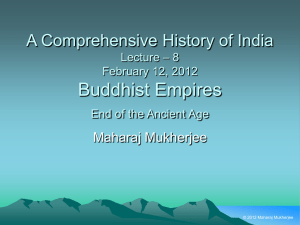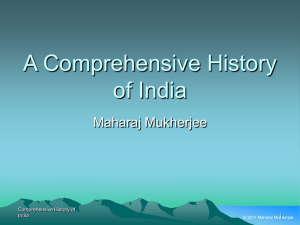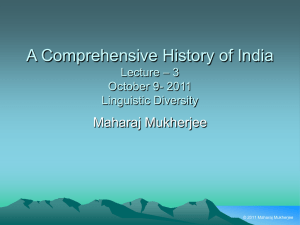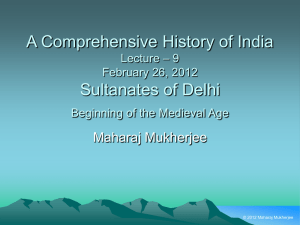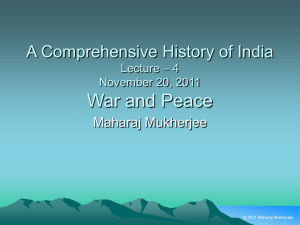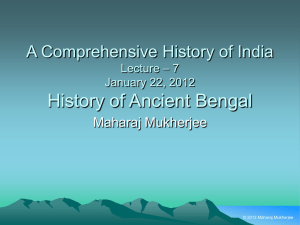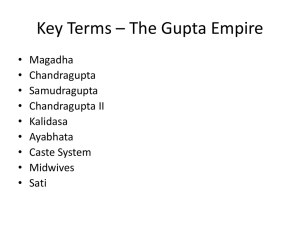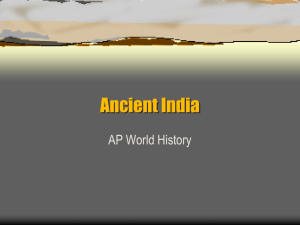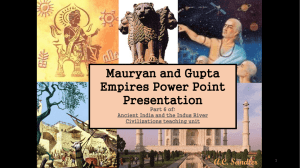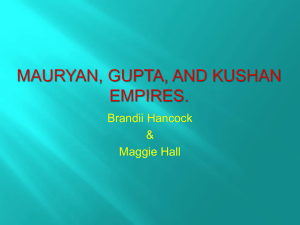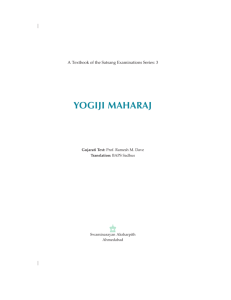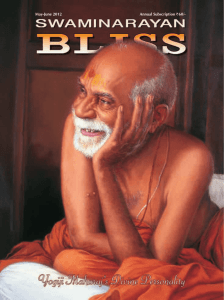Lecture 6 - Lipilekha
advertisement
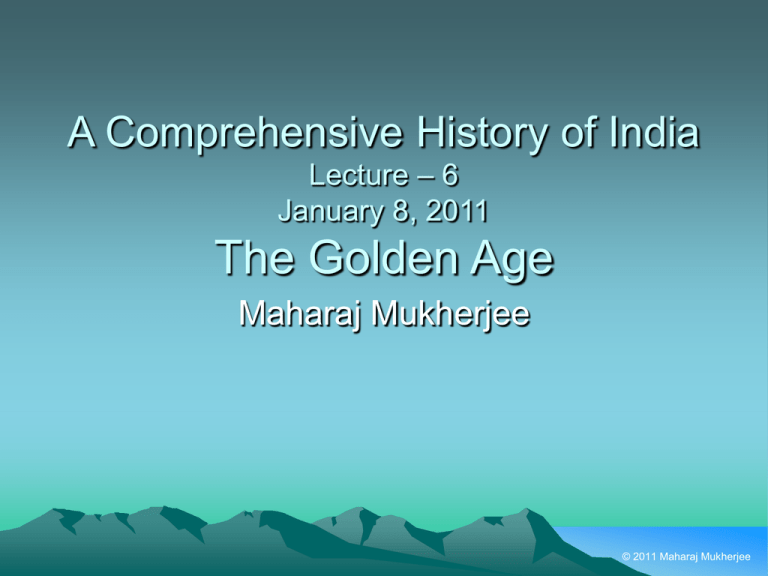
A Comprehensive History of India Lecture – 6 January 8, 2011 The Golden Age Maharaj Mukherjee © 2011 Maharaj Mukherjee Time Line Studied So Far • Early Inhabitants of India? – Hunter Gatherers – 15000 Years ago • Earliest Civilization in the World? – Fertile Crescent – 10000 Years ago • Earliest Civilization in India – City States – Indus Valley Civilization – 5000 - 6000 Years ago • Arrival of Aryans – 3500 - 4000 Years ago • Time of Ramayana – City States – 3000 - 3500 Years ago • Time of Mahabharata – Start of Empire Building – 2700 - 3000 Years ago • Time of Buddha and Mahavira – 2500 Years ago or about 600 BC • • • Persian Empire 500 BC onwards Alexander’s Greek Empire – 300 BC Mauryan Empire (Chandragupta and Ashoka) – 300 BC - AD © 2011 Maharaj Mukherjee Projects for Parents and Students • Think and Discuss: – Why did the Persian Empire and the Mauryan Empire lasted for more than 300 years and the Greek empire built by Alexander did not last more than a decade? • Learn about the Greek Thinkers © 2011 Maharaj Mukherjee Golden Age of Indian History • 1 AD – 400 AD • Time for Great Thinkers: – Science – Literature – Medicine – Engineering – Art • Continued exchange of ideas between Greek and Indian Thinkers © 2011 Maharaj Mukherjee Science • Arya (Arya Bhatta) – Mathematician, Scientist, Astronomer • Bhaskara (Bhaskara Acharya) – Mathematician, Astronomer, Physicist • Baraha Mihira (Mihira Bhatta) – Astronomer, Astrologer • Bramha Gupta – Mathematician © 2011 Maharaj Mukherjee Development in Astronomy • Ptolemaic System (Greek System) Earth is placed at the center of the Universe © 2011 Maharaj Mukherjee Arya Bhatta’s System Earth moves around the sun © 2011 Maharaj Mukherjee Bhaskara, Baraha Mihir • Found why and when eclipse happens • Found the cause of high and low tides © 2011 Maharaj Mukherjee Mathematics • Arya Bhatta, Bhaskara Charya, Bramha Gupta: – Developed basic algebraic systems – Found methods to solve basic Diophantine Equations of the form • A.x + B.y = z • A.x.x + B.y.y + C.x.y = z – Found methods to solve quadratic and cubic equations – Found methods to find sum of series: • 1+2+3+...+n=? • 1.1 + 2.2 +3.3 + . . . + n.n = ? © 2011 Maharaj Mukherjee Literature • Kalidasa – Shakuntala, Meghadutam, Kumar Sambhaba, Raghu Bansha, Ritu Sanhara, Vikrama Urvashi • Shudraka: – Mrichhakatika - The Clay Cart • Visakha Dutta – Mudra Rakshasha – The seal of Rakshasha – The story deals with how Chandra Gupta Maurya ascended to the throne of Magadha with the help of Chanakya © 2011 Maharaj Mukherjee Shakuntala by Kalidasa The story of the missing ring © 2011 Maharaj Mukherjee Arts and Architecture Mathura Art Form Gandhara Art Form • Influenced by Greek Arts • Details of human body are true to form • Traditional Indian Art Form • Bodily curves are smoother © 2011 Maharaj Mukherjee Engineering The Iron Pillar of Kumaragupta – in New Delhi, India © 2011 Maharaj Mukherjee 1 - 400 AD Golden Age of Indian History Empires of India British 100% Mughala 90% Maurya % of India Ruled 80% Gupta 70% Harsha 60% Sultaan 50% Pala 40% 30% Nanda 20% 10% 0% -500 SaatVahana Kushana 0 Rashtrakuta Chola 500 1000 1500 2000 Common Era © 2011 Maharaj Mukherjee Kushana • Hails from the Shaka Tribe – Shaka Tribes came from the same regions as the Aryans came from • The Caucasian regions (The area near Kazakhstan) • Some historians say that Shaka-s are also Aryans • The Kushana empire covered most of North Western India, Pakistan, Iran, Afganisthan and China • Felicitated the trade between far East (China) and Europe through the Silk Route © 2011 Maharaj Mukherjee Kushana Empire and the Silk Route Their Capital was Purushpura – Currently Peswar in Pakistan © 2011 Maharaj Mukherjee Kanishka – the Kushan Emperor • • • • Became Emperor in 89 AD Started the Shaka Era Converted to Buddhism Founder of the Mahayana Buddhism – Mahayana-s believe in gods – They also believe Buddha is God – It is the most commonly followed Buddhism now © 2011 Maharaj Mukherjee Gupta-s • First Chandra Gupta – The founder of the Gupta Empire – Made strong ties with other Indian Kingdoms • Samudra Gupta – Fought the Hun-s and other outside attackers • Second Chandra Gupta – Vikramaditya – Kalidasa was apparently in his court. • Kumaragupta – The last strong emperor of the © 2011 Maharaj Mukherjee The Gupta Empire © 2011 Maharaj Mukherjee Why Golden Age? • Both Kushan and Gupta Empires helped develop: – Stability in the country – Rule of Law – Strong Empire to Prevent outside attack – Trade and Business to grow wealth – Patronized human intellectual activities © 2011 Maharaj Mukherjee End of the Golden Age • Attacks by the Hun-s – The Huns also come from the same regions as Aryans and Shaka-s • The Caucasian regions – Some historians say that they are also racially related to the Aryans – Ruthless fighters – Efficient horse riders – Created the folk lore of Kalki Avatara and Kalki Raja (from Jain religious books) © 2011 Maharaj Mukherjee Quiz 1. When did the Golden Age Happen? • 2. 0 – 400 AD Why is it called the Golden Age? • 3. Because of developments in science, art, literature, engineering What was the contribution of Arya Bhatta in Science? • 4. Show that Earth moves around the Sun Who wrote Shakuntala? • 5. Kalidasa Where did the Shaka-s come from? • 6. Caucasian regions What is the Silk Route? • 7. Ancient trade route extending from China to Europe through Asia Name one of the Shaka Emperor • 8. Kanishka Name One of the Gupta Emperors • 9. Chandra Gupta, Samudra Gupta, Kumara Gupta How did the Golden Age end • Outside attacks by Huns © 2011 Maharaj Mukherjee
